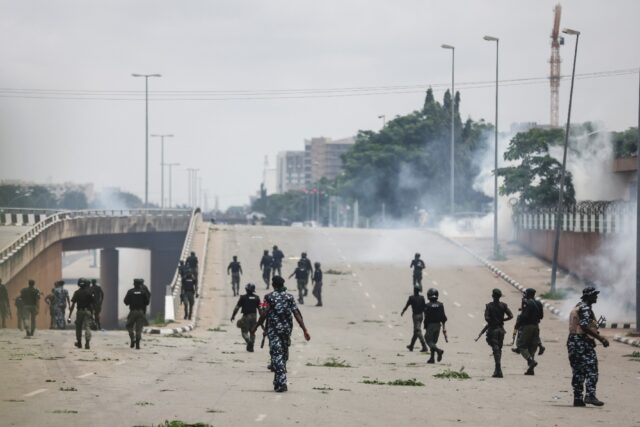Nigeria’s President Bola Ahmed Tinubu called for the suspension of nationwide protests and an end to “bloodshed” on Sunday after security forces cracked down on rallies over economic hardship.
Thousands of people began taking to the streets last week to protest government policies and the high cost of living.
Rights group Amnesty International has accused security forces of killing at least 13 demonstrators in the first day of protests on Thursday, while police say seven people have died and deny responsibility.
In a televised address, Tinubu urged the demonstrators “to suspend any further protest and create room for dialogue,” his first public comments since the rallies started.
“I have heard you loud and clear. I understand the pain and the frustration that drive these protests, and I want to assure you that our government is committed to listening and addressing the concerns of our citizens,” he said.
“But we must not let violence and destruction tear our nation apart,” he warned. “We must stop further bloodshed”.
‘Hunger and deep poverty’
Tinubu blamed organisers for failing to prevent disorder, and used the speech to defend his record and outline measures he said would benefit young Nigerians and the economy.
Africa’s most populous country is suffering its worst economic crisis in a generation with high inflation and a tumbling naira after Tinubu ended a fuel subsidy and currency controls more than a year ago.
The US-based World Bank and International Monetary Fund said the measures were needed to revive the economy and the president again appealed for patience in his speech, saying his reforms would attract foreign investors.
The measures have dealt a heavy blow to Nigerians, though. Food prices have soared and hunger is spreading, especially in the north.
Dubbed #EndbadGovernanceinNigeria, the protest movement won support with an online campaign that called for the government to bring down fuel prices and tackle the cost of living crisis, among other demands.
But the authorities warned they would come down hard on attempts to copy recent anti-government protests in Kenya, where demonstrators forced the president to abandon new taxes.
Damilare Adenola, leader of the Take It Back group organising protests in the capital Abuja, said the president had “no right to halt the expression of aggrieved citizens.”
“As for bloodshed, his government is the one who should cease killing peaceful protesters, because that won’t stop the protest,” he told AFP.
Tinubu said “security operatives should continue to maintain peace, law, and order in our country following the necessary conventions on human rights.”
The country’s police force said it had arrested nearly 700 people in the first two days of demonstrations, accusing them of “armed robbery, arson, mischief” and destroying property.
Amnesty has urged police to release demonstrators and refrain from firing live rounds to break up crowds.
On Friday, it said “security personnel at the locations where lives were lost deliberately used tactics designed to kill while dealing with gatherings of people protesting hunger and deep poverty.”
Kano deaths
The protests eased in many places on Saturday, but security forces again fired teargas at demonstrators in Abuja and residents told AFP that police killed three people at a rally in the northern city Kano.
The city has seen intense clashes in recent days and residents said police in the Rijiyar Lemo district fired shots and tear gas at a crowd throwing stones on Saturday afternoon.
Resident Sanusi Usman said the police used “live bullets to disperse the crowd.”
“Three people were killed, including two minors and a pregnant woman who was hit as she was crossing the road,” he said.
Awwalu Ibrahim, another resident, also told AFP that “three people were hit and killed, two boys and a pregnant woman who was crossing the highway.”
“One of the boys was nine years old,” Ibrahim said. “He was the son of my neighbour.”
Police have not responded to requests for comment.

COMMENTS
Please let us know if you're having issues with commenting.